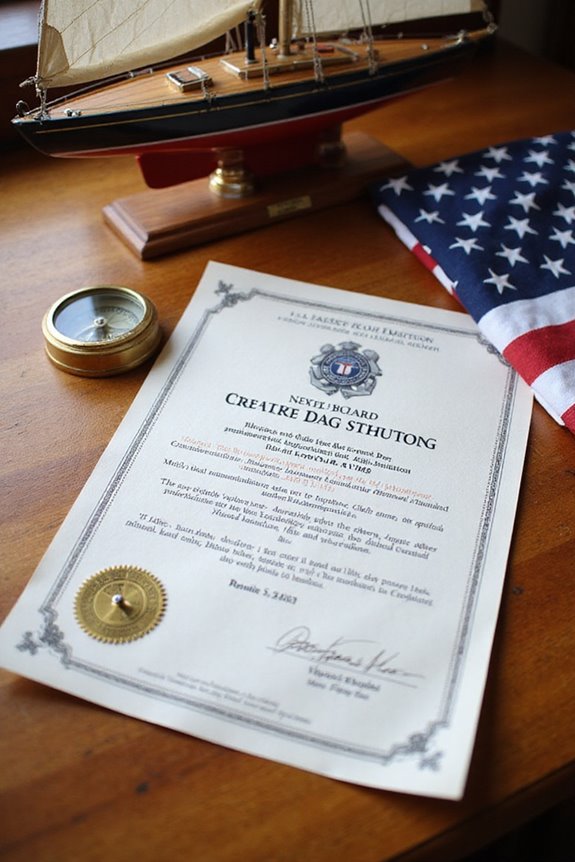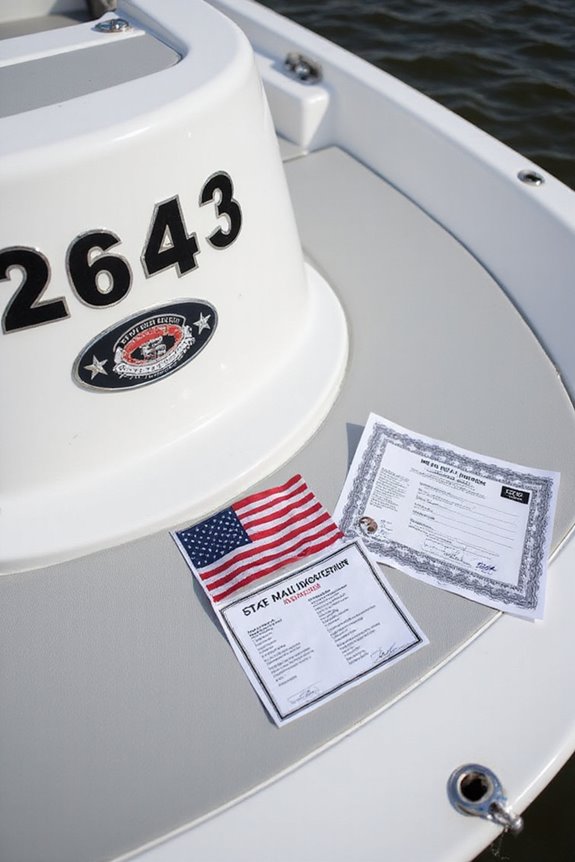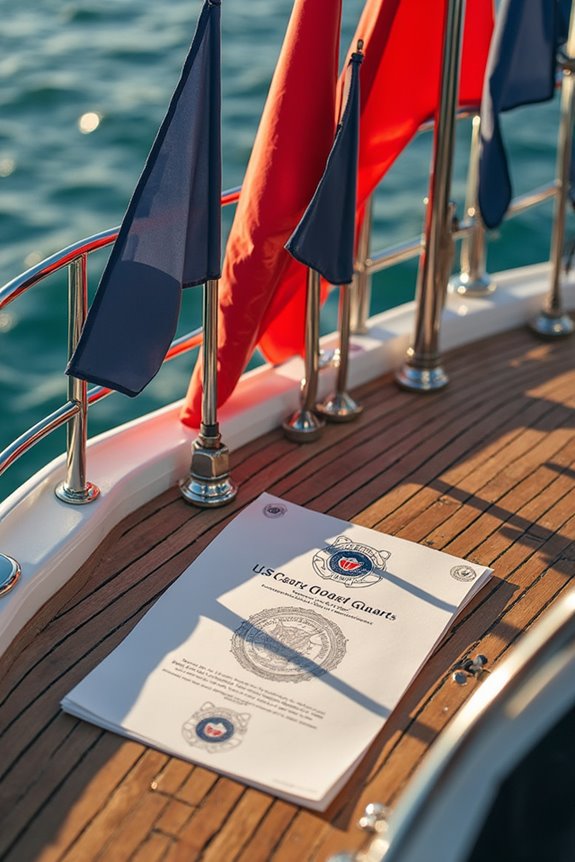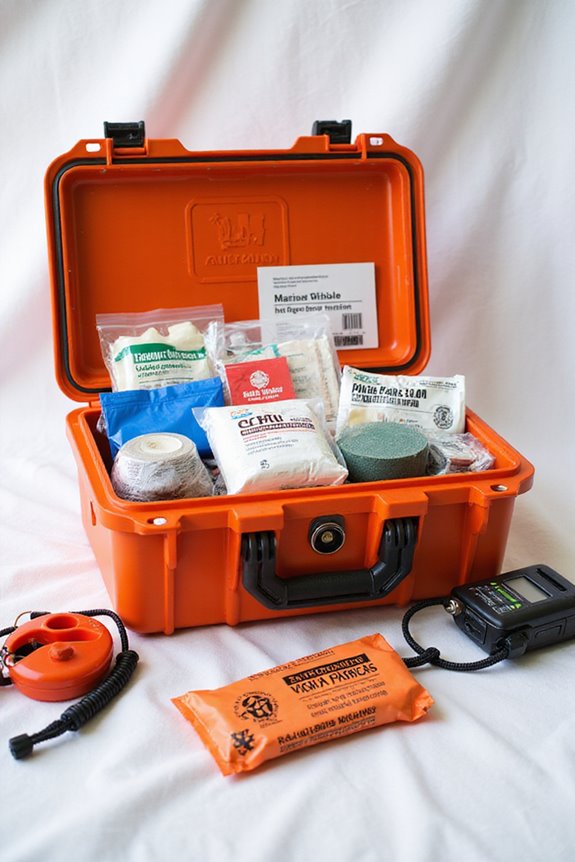Maneuvering your boat’s flag registration might feel tricky, but it’s essential for legal identity and smooth sailing. Should you go federal with U.S. Coast Guard documentation, state registration, or even a foreign flag? Each has perks—federal documentation offers international status and lender trust, while states require visible numbers and renewals. Commercial and recreational vessels show different flags, too. Curious how to pick the right option or avoid common pitfalls? Let’s explore what fits your cruising style best.
Key Takeaways
- Flag registration provides legal identity and ensures compliance with safety and environmental standards enforced by the chosen flag state.
- Selecting a flag state depends on regulatory compliance, taxation, crewing rules, reputation, and alignment with your maritime goals.
- Commercial vessels use national ensigns for official identification, while recreational boats may display yacht ensigns reflecting tradition and etiquette.
- U.S. Coast Guard documentation offers federal recognition, smoother foreign access, and ownership clarity but requires U.S. citizenship and size eligibility.
- State registrations often require proof of ownership, visible registration numbers, and periodic renewal, primarily for motorized and some non-motorized boats.
Importance of Vessel Flag Registration
Even though it might seem like just paperwork at first glance, registering your vessel’s flag is actually a pretty big deal in the maritime world. When we register our boats, we’re not just ticking boxes—we’re committing to all those complex maritime laws that keep our waters safe and orderly. Think of it as a club membership where the rules aren’t just suggestions; they’re backed by the flag state, which enforces important safety standards. This guarantees our boats meet safety checks regularly, protecting us, our crew, and the environment from unnecessary risks. Isn’t it reassuring knowing your vessel operates under a recognized legal framework? Plus, proper flag registration gives us a legal identity on the international stage, easing customs and port procedures wherever we sail. It’s more than paperwork—it’s your boat’s passport to the sea.
Selecting the Right Flag State for Your Boat

How do we choose the right flag state for our boat without getting lost in a sea of options? First, we’ll want to weigh key flag state criteria like regulatory compliance and taxation—because nobody wants surprise fees or tangled paperwork. Operational advantages matter, too; flexible crewing rules or fewer home port restrictions can make cruising smoother and less stressful. Let’s not forget reputation: a well-regarded flag state opens doors in international waters, boosting both resale value and peace of mind. It’s like picking a club membership—some flags come with better perks and support services, while others might bog us down. So, keeping these factors in mind helps us find a flag that fits our maritime lifestyle perfectly, without making waves.
Differences Between Commercial and Recreational Vessel Flags

When we look at flags on boats, it’s easy to assume they all serve the same purpose, but commercial and recreational vessels actually play by different flag rules. Commercial vessel flags mainly fly the national ensign—this signals their nationality clearly, especially important in international waters. Recreational vessel flags, though, like those on yachts, have a bit more personality. Sure, they can fly the national ensign too, but many sport the Yacht Ensign when cruising domestic waters—a nod to tradition and etiquette rather than strict law since 1980. Ever wonder why a yacht’s flag seems so fancy? It’s all about making a statement among fellow boaters. So, while commercial flags shout official ID, recreational flags balance pride, tradition, and a splash of flair on the water.
Overview of U.S. Coast Guard Vessel Documentation

Although registering your boat with the state might seem like the obvious choice, the U.S. Coast Guard offers a federal option that’s worth considering. Vessel eligibility requirements include being wholly owned by a U.S. citizen and meeting size criteria—usually five net tons for recreational boats. You might wonder, why choose federal documentation? Well, the documentation benefits are solid: it’s internationally recognized, making foreign port stops smoother, and lenders prefer it because it clearly establishes ownership. Also, documented boats skip the clutter of state numbers, keeping your vessel’s look sleek. Keep in mind, federally documented boats must display their name and hailing port, not state numbers. So, if you’re aiming for smooth sailing and solid ownership proof, Coast Guard documentation could be your new best mate.
State Registration Requirements and Numbering Rules

Since most states require us to register our boats—motorized or even some non-motorized types—it’s essential to understand what this entails before we hit the water. State registration means we need to provide proof of ownership and complete paperwork, often in person at a local DMV or boating office. Each state has its own numbering rules, usually requiring the registration number to be at least three inches high, in block letters, and visible on both sides of the bow. Colors must contrast, so nobody mistakes our boat for a floating billboard. Numbers stay the same but need renewal, much like a driver’s license. Knowing these rules helps us avoid surprises and keeps our boating community running smoothly—because who wants to deal with fines when we could be sailing?
Exemptions From Registration and Number Display
While lots of boats need to be registered and display their numbers proudly, there are actually quite a few exceptions that can save us some paperwork headaches. For example, in California, seaplanes, houseboats, and non-motorized sailboards meet the exemption criteria and don’t require registration. Texas also exempts non-motorized canoes and kayaks, no matter their size. If your vessel is documented by the U.S. Coast Guard or mainly used out of state, you might skip the standard registration process. Even racing boats visiting temporarily often bypass these rules. We just need to check local rules to see which exemptions apply. Knowing these details means we avoid unnecessary forms without missing any legal boxes—a small win for boaters like us, right?
Consequences of Non-Compliance and Enforcement Policies
We’ve talked about which boats might skip registration, but what happens if a boat owner doesn’t play by the rules? The penalties overview isn’t pretty—fines, vessel suspension, or worse. Repeat offenders might even face criminal charges or jail time. It’s more than just a slap on the wrist; non-compliance can weigh heavily on your wallet and your freedom to sail. Enforcement policies are serious business, with state and federal authorities conducting on-site inspections to check that registration numbers are properly displayed and all documentation is onboard. So, sticking to compliance guidelines isn’t just about avoiding trouble—it’s about keeping our boating community safe and fun for everyone. After all, no one wants to be the captain pulled over for an avoidable paperwork snafu, right?
Frequently Asked Questions
Can Dual Flag Registration for a Boat Be Legally Maintained?
We’re sailing through legal seas where dual registration legality isn’t a myth but a tightrope walk. Together, we’ll navigate flag state obligations, ensuring our boat’s dual flag registration is maintained without capsizing under complex laws.
How Do International Maritime Treaties Affect Flag Registration Choices?
It is understood international maritime treaties require flag state compliance, meaning our flag registration choices carry crucial maritime law implications. Together, we must pick flags ensuring our vessels meet these standards, keeping us united in safe, lawful seafaring.
What Environmental Regulations Are Tied to Specific Flag States?
Think of flag states as gardeners tending a shared sea garden; each has environmental compliance duties shaping our vessel’s health. Together, we embrace these flag state responsibilities, nurturing a cleaner, greener maritime community we’re proud to belong to.
Are There Insurance Benefits Linked to Certain Vessel Flag Registrations?
When we choose certain vessel flags, we often see insurance discounts thanks to better risk assessment aligned with those flags. Together, we benefit from reduced premiums and smoother claims, making our boating experience even more secure and connected.
How Does Ownership Transfer Affect Flag Registration Renewal or Change?
When ownership transfers, we face key ownership implications affecting registration processes—renewals may require new registrations under our name, timely document updates, and notifying authorities, helping us stay united in compliance and avoid penalties together as part of our boating community.





